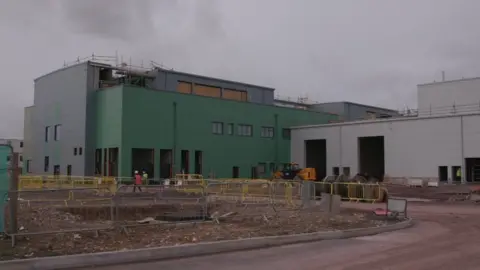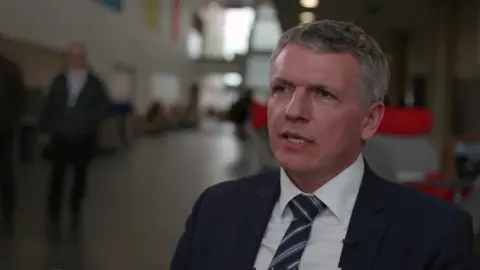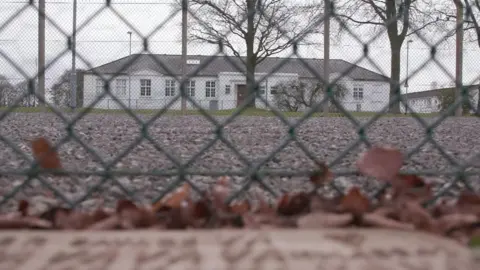Russian spy: Inside UK lab that identified nerve agent
 BBC
BBCThe UK's military research base at Porton Down has been at the heart of the investigation into what happened to Russian former spy Sergei Skripal and his daughter Yulia. The BBC has been granted exclusive access to the Wiltshire lab.
The headquarters of the Defence Science and Technology Laboratory (DSTL) at Porton Down is a sprawling campus.
Stern warning signs and red flags make clear it is a sensitive facility as you approach. And beyond the security perimeter, there are buildings old and new, some with open-plan offices, others with labs.
An urgent call came in here in the early hours of Monday 5 March.
DSTL is used to being contacted in response to major incidents in the UK such as terrorist attacks. But this was different.
This time the incident was only a few miles down the road in Salisbury. A man and a woman had been found on a park bench the previous day and it had become clear they were not suffering from an ordinary illness.
A few hours after the call, one of the Specialist Response Teams, ready 24/7 for such calls, was deployed.
Military grade
The initial symptoms from the patients seemed consistent with a nerve agent. The team collected samples which were then analysed at the labs in Porton Down.
We were shown one lab where one type of test can be undertaken on such samples, but officials will not go into details about the exact chemistry involved with the tests after Salisbury.
However, the tests did confirm that a military-grade nerve agent had been deployed on the streets of Britain. A combination of this scientific analysis and other information would in turn lead to the government's conclusion that it was highly likely Russia was behind the attack.
DSTL officials say that its role has been to use its scientific expertise to support the police investigation, including the need to keep material forensically secure so there is a proper evidential trail, as well as assist the medical teams involved in treatment and help with broader public health concerns.
It has been helping check the police and emergency workers who have been to various locations to make sure that they have not been contaminated. This has all led to a far higher profile for the site than it has been used to.
'No way' chemicals escaped
We were invited into the site but there were strict limits about what we were able to see. Armed police and dogs patrol the perimeter.
Not all the attention has been welcome. Russian officials have made pointed reference to the proximity of Porton Down to Salisbury with the suggestion the nerve agent might even have come from here.

That is something the chief executive of DSTL is firm in denying. "We've got the highest levels of controls of security around the work that we do here," Gary Aitkenhead told me.
"We would not be allowed to operate if we had lack of control that could result in anything leaving the four walls of our facility here.
"There's no way that agent would have left. We have complete confidence that nothing could have come from here out into the wider world."
Asked if it was frustrating to hear such accusations, he said: "It is coincidence that it is down the road [and] that this has happened. It is frustrating to hear that and it is just not true. "

Officials are keen to emphasise that the work here is defensive only. In one building, the size and shape of a bungalow, we are shown a sealed metal chamber.
Inside a robot called "Porton Man" wears a military protection suit as live agents are pumped in. The aim is to see what defence the suit offers over time as the robot moves.
Huge effort needs to then go into cleaning the chamber and disposing of the agents. The work here is also much broader then just dealing with chemical and biological weapons but also covers ballistics, explosives and cyber security amongst other fields.
Officials say the defensive remit has increasingly moved to supporting homeland security as well as the military in recent years.
A large building is being constructed in one corner of the campus. There have been claims from Russia that it might be some kind of chemical weapons factory.
"That's just nonsense. This is a defensive organisation," Sir David Pepper, the chairman of DSTL, told the BBC, in response to those claims.
Officials at DSTL say the planning application has long been available at the local council, explaining that it going to be a new facility for forensic analysis of explosives.
DSTL has been involved in recent investigations including the attack at the Manchester Arena last year. New money to upgrade facilities was recently announced.
International inspectors from the Organisation for the Prohibition of Chemical Weapons have arrived in the UK. They have been to the location in Salisbury and have also been given permission, following approval by a judge, to take a sample of the Skripals' blood.
They are also present at Porton Down itself. The DSTL is an OPCW certified lab and the inspectors will be carrying out their own work here and at other labs around the world to independently verify the work done by DSTL.
